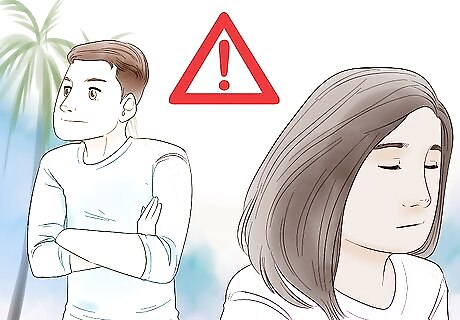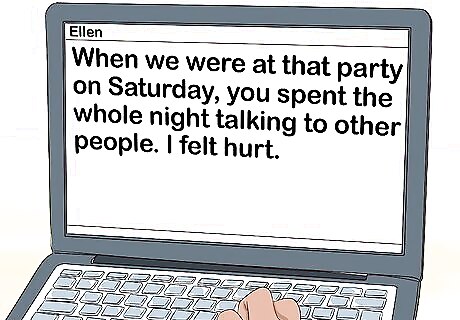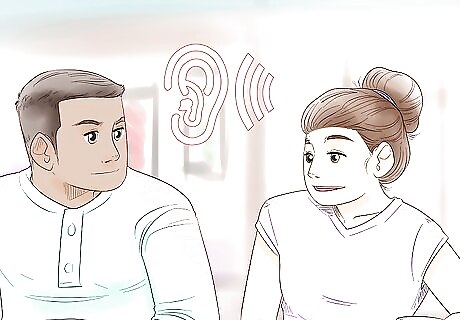
views
Accepting Her Feelings

Give her space. It's possible that your girlfriend is mad at you, but it's also possible that she's going through something tough that has nothing to do with you. Either way, if you are getting negative feelings from her, don't push her to talk right away. Give her some time to cool down. This will also give you time to think through your own feelings.

Ask yourself if she's actually ignoring you. Has your girlfriend's behaviour actually changed toward you? Is it possible that you're feeling depressed or anxious about something, and that you're imagining that her behaviour is worse than normal? It's possible that she has always been a bit cold toward you, but that as the relationship gets older, you are realizing that you don't like the way she behaves. Have you been through anything difficult recently? Maybe you've been demanding more attention from her lately, and she's having a hard time meeting your needs, which has resulted in her pulling away. You and your girlfriend might have miscommunicated about how much time you want to spend together or how frequently you want to talk. Talk to her about how often you'd like to communicate, and ask her what she needs. Try to find a balance between both your needs.

Consider that your girlfriend may be depressed. She may be ignoring you, but if she's struggling with depression, she might not even realize it. Signs of depression include difficulties concentrating and making decisions; fatigue; feelings of helplessness, hopelessness, and/or worthlessness; insomnia or excessive sleeping; irritability; loss of interest in pleasurable activities such as sex or date nights; overeating or loss of appetite; anxiety; suicidal thoughts and/or destructive behaviour. If you think your girlfriend might be depressed, there are things that you can do to help.

Avoid the temptation to ignore her back. As tempting as it may be to ignore her back or try to make her jealous, it's not healthy or productive to do so. In addition, if your girlfriend is depressed or struggling with some other difficult personal problem, ignoring her back will only make things harder for her, and could really damage your relationship. The “Elastic Band Theory” suggests that you can make someone want you by pulling away from them. It may work for some people in the short term, but it is not the type of behaviour that you can build a healthy relationship on. One piece of positive advice that you can take from the “Elastic Band Theory” is that people in relationships need space to do their own thing, otherwise they will tire of one another or begin to take one another for granted. You can take time for yourself and still be kind and respectful to your girlfriend. Don't ignore her, but do make sure that you have a life outside of her.

Take care of yourself. Try not to dwell on how hurt/upset your girlfriend's behaviour is making you feel. Remind yourself that she can't actually “make” you feel anything, and that you have a choice: you can choose to acknowledge that you're upset, but to not let it hold you back from enjoying life. Do things that make you feel good: visit with friends, go to the gym, pick up hobbies (for example, playing guitar, making movies, or hiking).
Talking to Her with Compassion

Set a date to speak in person. If your girlfriend is completely ignoring you, you might not be able to get in touch with her via phone or in person. If you know she is still getting your texts, you might try sending her a message that expresses your concern and asks her to meet up and talk. Example: “You haven't been responding to my texts lately. When that happens, I feel hurt and wonder if you're still happy in our relationship. Can we meet up and talk?” If you know her schedule, you might even suggest a day and time when she is usually free, which could make it easier to get her to commit to meeting up.

Send an email or private message. Skip this step if your girlfriend responds to you via text or phone. If you can't get in touch with her via text or phone, but you know that she is still okay (i.e. hanging out with friends, posting to social media), you might try sending her a message that lays out your feelings and concerns via her Facebook inbox or an email address. If you choose to send an email/private message, be sensitive to your tone. Write a draft, then re-read it after you've had a good night's sleep. Make sure that it isn't mean or disrespectful. Be specific. Provide concrete examples of what she does and how you feel. Be sure to word it in a way that isn't accusatory: “When we were at that party on Saturday, you spent the whole night talking to other people. We didn't get a chance to talk at all, and you left without saying goodbye, even though we were sitting across from each other in the same room. When you did that, I felt hurt. I wasn't sure if I had done something wrong. I am worried about you, and I am worried about us. I would like to get together in person and talk this through. Or, if you're uncomfortable with that, I am also open to communicating via email for now.” Before sending your email, try to put yourself in her shoes as you give it a final read. Think about how it might sound to her, and how she might react, and edit it to ensure that you are sharing your thoughts and feelings in the most effective way possible. If she understands your side and doesn't feel threatened, she's more likely to respond.

Use empathetic body language. If you manage to meet up with her in person to talk, use empathetic body language. This will show her that you're committed to understanding her side of the story, and it should encourage her to open up. Empathetic body language includes facing the person in an open position (i.e. not crossing your arms or hunching over or turning away), nodding and using eye contact to signal that you hear what she's saying, and making reassuring sounds to show understanding without interrupting.

Express your thoughts and feelings using nonviolent communication. In nonviolent communication, you focus on your own thoughts and feelings rather than accusing the other person of doing something wrong. Organize what you say in the following order: observations, feelings, needs, and requests. Example: “For the past week you've not answered my calls and you've cancelled our plans twice. I'm starting to worry that you're not interested in having a relationship with me any more.”

Ask her about herself. After you've expressed how you feel, let her know that you are open to communication, and encourage her to share her feelings. Example: “For the past week you've not answered my calls and you've cancelled our plans twice. I'm starting to worry that you're not interested in having a relationship with me any more. I would like it if we could have a conversation about our relationship. If it's not our relationship that's the problem, then I would like it if you could open up to me about what else is going on.”

Ask her what she needs. If she admits that she's unhappy in some way, ask her what she needs/what you can do. She might need space, or maybe she wants you to do something you're not doing — it might even be something simple like hugging her more often or telling her she's beautiful. If she asks for space, don't panic. Again, this could be completely about her and really have nothing to do with you. Ask her if she knows how long she might need. If she says she doesn't know, suggest a time that feels okay to you — perhaps a week. Be supportive. Ask her if there's anything you can do — for example, call at the end of the week to check in. If you decide to give each other space, ensure that you are both clear on what that means. For some, space might just mean only talking on the phone twice a week instead of every night, or, it might mean an entire week without any communication whatsoever. Clarifying what “space” means to you will help make that time easier. Know that you don't HAVE to give her what she says she needs. If you aren't comfortable with something that she requests, it's okay to tell her that. The two of you might be able to make a compromise. Ultimately the two of you need to respect one another's needs and boundaries.

Be an active listener. When it's her turn to speak, actively listen to her. This involves empathetic body language (open stance, nodding, reassuring sounds) as well as showing your understanding by repeating what she has said and/or asking for clarification. If you are hurt by something that she says, it's okay to let her know that, but try to let her know in a non-confrontational way. Example: “Thank you for opening up to me. When you said that I'm too clingy, I felt sad and a bit confused. I enjoy spending time with you, but I'm also happy to do my own thing. I would like to know some of the specific things I do that lead you to think that I'm clingy. Maybe I'll be able to change some of those things.” If she can give you some specific examples, even if you don't agree with them, it will help you get a better sense of what she wants from the relationship. Knowing what she wants will give you a clearer idea of whether you're able or willing to give it to her. Don't roll your eyes or interrupt her while she is talking. Let her get it all out before you respond. What she has to say might be upsetting for you to hear; you might not agree, but just let her get it all out before you respond.
Finding a Resolution

Come up with some possible solutions together. Once you've worked out what some of the problems may be, work together to figure out how you can resolve them. If she's said that she's ignoring you because she feels overwhelmed by how much attention you pay to her, ask her to give you some specific examples of the things that you do that make her feel that way. Perhaps she doesn't like that you call her three times a day: at breakfast, lunch, and dinner. Maybe you can agree to a “good morning” text and a short phone call after dinner every day.

Don't force a resolution. Sometimes it's better to take a break when emotions are heated, and to return to an argument later, especially if you've already been arguing for several hours. If you find that you're going in circles and solving nothing, it's probably a good time to take a break. Perhaps you can't meet up again for two days, and you would rather get it all sorted now. That desire is totally normal, but it really won't help either of you when you're both too exhausted from arguing to even think clearly.

Understand that one of the resolutions might be to break up. Chances are, if you're worried about your girlfriend ignoring you, you want to keep the relationship. If it's not a problem with your perception and it's not something personal that she's struggling with, and if she's really just ignoring you because she's mad at you, you need to consider whether you want to be in a relationship with someone who would rather hurt you than tell you why they're upset.




















Comments
0 comment